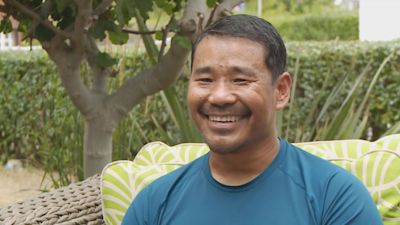Kent army veteran hopes to become first double above the knee amputee to climb Everest

Report by ITV Meridian's Kit Bradshaw
A former British soldier is hoping to fulfil his dream of climbing Mount Everest - and becoming the first double above-the-knee amputee to do so.
Having served in the British Army's Ghurka regiment for 15 years, Hari moved to Canterbury in 2009 a year before losing both legs in Afghanistan after an Improvised Explosive Device (IED) exploded while on patrol.
He's hoping to inspire others with disabilities by completing the dangerous and gruelling feat.
"It's already been an adventure getting to this point, but through the climb I hope we can positively transform the way people with a disability are perceived, and how they perceive themselves."
The 43-year-old is being trained by, and climbing with, Krishna Thapa, former Chief Mountain Instructor at the SAS and world-renowned climber.
He only has 9 months left to prepare for the ultimate summit.
With reduced mobility, Hari uses three times more energy than the average climber, with Everest expected to take him three times longer than an able-bodied mountaineer.
He will climb to the 8,848.86m (29,029ft) summit of Everest across the South Col route from Nepal, negotiating some of the world's toughest mountaineering conditions.
Cutting-edge equipment and technology will be important, but this is a true test of Hari's human limits, both physical and mental.
Hari added: "From specially designed crampons to the heated sockets around my stumps and the short prosthetic legs I'll be using for the climb - we are developing new technologies that will allow me to climb Everest.
"But it's much more than that, everything needs to be adapted to get me onto the mountain right down to made to measure clothing."
The plan was almost scuppered 4 years ago when the Nepalese government banned those with certain disabilities from attempting the climb - a policy that was later overturned in the country's Supreme Court.
In 2018, Hari joined forces with other climbers and disability charities to successfully overturn a ban on double amputees and the visually impaired from climbing Everest at the Supreme Court in Nepal.
Now, Hari has a fresh hurdle - crowdfunding the more than £300,000 needed for the trip - which he hopes to undertake next Spring.